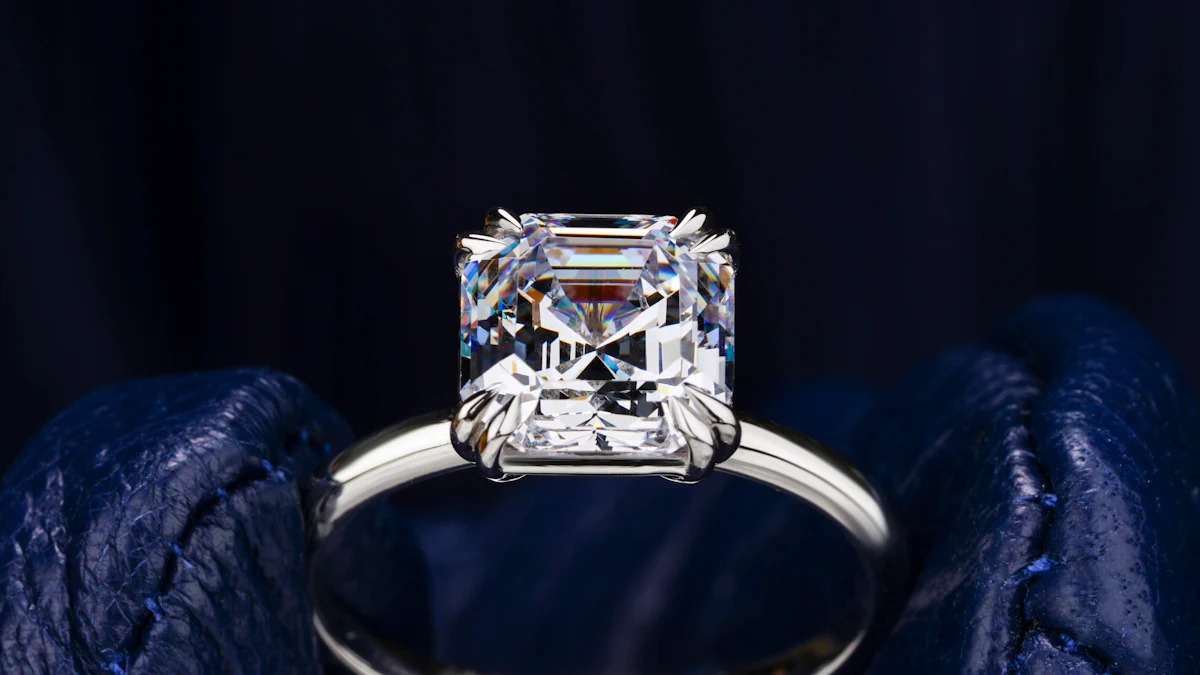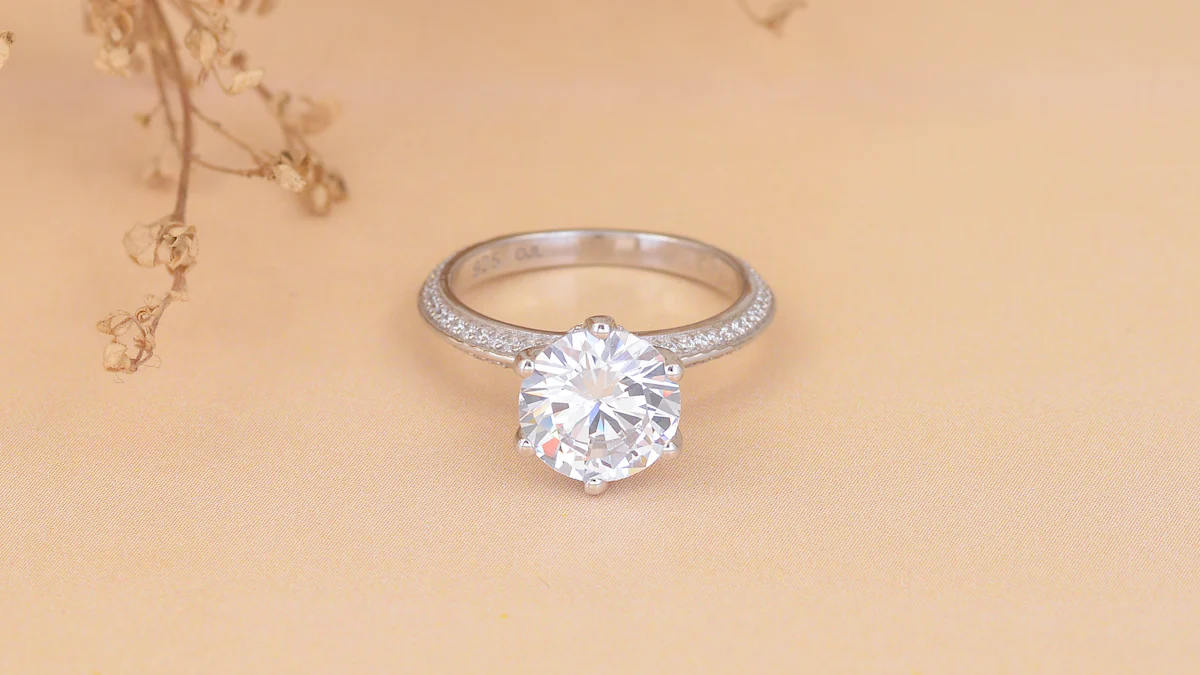Understanding 1 Carat Diamond Size

When you think about diamonds, the question often arises: How big is a 1 carat diamond? It's important to know that a carat measures weight, not size. A well-proportioned one carat diamond typically spans about 6.5 millimeters in diameter. This measurement can vary slightly based on the diamond's cut and shape. Understanding the dimensions of a 1 carat diamond size helps you appreciate its true value and appearance. Whether you're shopping for an engagement ring or simply curious, knowing these details can guide your choices in the dazzling world of diamonds.
The Basics of 1 Carat Diamond Size
Weight vs. Size
Understanding carat as a weight measure
When you hear the term "carat," you might think it refers to the size of a diamond. However, a carat actually measures weight. One carat equals 0.2 grams. This weight doesn't directly translate to how big a diamond looks. The weight of a diamond can influence its price, but it doesn't always determine its visual size. So, when you're considering a diamond, remember that carat is about weight, not size.
Average dimensions of a 1 carat diamond
You might wonder, "How big is a 1 carat diamond?" On average, a well-cut round diamond with one carat weighs about 6.5 millimeters in diameter. But this can vary. Different shapes and cuts can make a diamond appear larger or smaller. For instance, a 1 carat diamond in an asscher cut might measure around 5.5 millimeters across. Understanding these dimensions helps you appreciate the true size appearance of a diamond.
The Role of Shape in Perceived Size
Common diamond shapes and their dimensions
Diamonds come in various shapes, each offering unique characteristics. Some popular shapes include round, princess, oval, and asscher. Each shape has its own dimensions, which can affect how big the diamond looks. For example, a round diamond often appears larger than a princess cut of the same carat weight. This is because the round shape maximizes the diamond's surface area.
How shape affects the visual size of a diamond
The shape of a diamond plays a crucial role in its perceived size. Round diamonds tend to look larger due to their brilliant cut, which reflects more light. On the other hand, fancy shapes like emerald or asscher might appear smaller because of their deeper cuts. When choosing a diamond, consider how different shapes can affect the 1 carat diamond size. A diamond size chart can help you visualize these differences and guide your decision.
The Impact of Cut on 1 Carat Diamond Appearance

What is Diamond Cut?
Explanation of cut quality and its importance
When you think about diamonds, the cut might not be the first thing that comes to mind. However, it's crucial for a diamond's beauty. The cut refers to how well a diamond's facets interact with light. A well-cut diamond reflects light beautifully, creating that sparkle everyone loves. This brilliance makes a diamond stand out, enhancing its overall appearance. In fact, studies show that cut quality significantly influences a diamond's brilliance, fire, and perceived size. So, when you're considering a one carat diamond, remember that the cut can make all the difference.
How cut affects brilliance and perceived size
You might wonder, "How big is a 1 carat diamond?" The answer isn't just about measurements. The cut plays a huge role in how big a diamond appears. A well-cut diamond can look larger than its actual carat weight. This is because a good cut maximizes the diamond's surface area and reflects more light. On the other hand, a poorly cut diamond might look smaller and less brilliant. So, if you're using a diamond size chart, keep in mind that the cut can change the size appearance of a diamond.
Cut Quality and Price
The relationship between cut quality and diamond pricing
When shopping for diamonds, you'll notice that cut quality affects the price. High-quality cuts often come with a higher price tag. This is because a well-cut diamond offers superior brilliance and visual appeal. The craftsmanship involved in achieving an excellent cut adds to the cost. However, this investment can be worth it, as a well-cut diamond enhances the perceived size and beauty of the stone.
Balancing cut quality with budget considerations
Balancing your budget with cut quality can be tricky. You want a diamond that looks stunning without breaking the bank. One approach is to prioritize cut quality over carat weight. A smaller diamond with an excellent cut can appear larger and more brilliant than a bigger diamond with a poor cut. Consider what matters most to you: the 1 carat diamond size or its sparkle and brilliance. By focusing on cut quality, you can find a diamond that fits both your aesthetic preferences and budget.
Comparing Different 1 Carat Diamond Shapes

When you're choosing a diamond, the shape plays a big role in its appearance and value. Let's dive into the differences between round and fancy shapes to help you make an informed decision.
Round vs. Fancy Shapes
Characteristics of round diamonds
Round diamonds are the most popular choice for many. They boast a classic look and unmatched sparkle. The symmetrical shape and precise facets maximize light reflection, giving them that brilliant shine everyone loves. This high demand and complex cutting process often make round diamonds more expensive. If you're looking for a timeless piece with maximum brilliance, a round diamond might be your best bet.
Characteristics of fancy shapes (e.g., princess, oval)
Fancy shapes like princess, oval, and others offer unique styles and can provide better value for their size. These shapes often appear larger than round diamonds of the same carat weight due to their elongated or angular designs. For instance, an oval diamond can make fingers look longer and more slender. Fancy shapes also allow for more creativity in jewelry design, giving you a chance to express your personal style. Plus, they often come at a lower price point compared to round diamonds, making them an attractive option if you're budget-conscious.
Visual Comparisons
How different shapes appear in the same carat weight
You might wonder, how big is a 1 carat diamond in different shapes? The answer varies. A one carat diamond in a round shape typically measures about 6.5 millimeters in diameter. However, fancy shapes like ovals or marquises can appear larger due to their elongated forms. This difference in appearance is crucial when considering the overall diamond size. A diamond size chart can help you visualize these variations and understand how each shape presents itself.
Choosing a shape based on personal preference
Ultimately, the choice of shape comes down to personal preference. Do you prefer the classic sparkle of a round diamond, or does the unique allure of a fancy shape catch your eye? Consider what suits your style and the statement you want your diamond to make. Trying on different shapes can also help you see how they complement your hand and personal style. Remember, the best diamond is the one that feels right for you.
Practical Tips for Choosing a 1 Carat Diamond Ring
Choosing the perfect 1 carat diamond ring involves more than just picking a stone. You need to consider the setting and how it complements the diamond. Let's explore some practical tips to help you make the best choice.
Consider the Setting
How setting affects the appearance of size
The setting of a diamond can dramatically influence how big it looks. A well-chosen setting can enhance the diamond's appearance, making it seem larger than its actual carat size on hand. For instance, a halo setting surrounds the center diamond with smaller stones, creating an illusion of a bigger diamond. Similarly, a prong setting lifts the diamond, allowing more light to pass through and enhancing its brilliance. When selecting a setting, think about how it will affect the diamond size and overall look of your one carat diamond ring.
Popular settings for 1 carat diamonds
Several settings are popular for 1 carat diamonds. The solitaire setting is a classic choice, showcasing the diamond's beauty without distractions. If you prefer something more intricate, consider a pavé setting, where small diamonds are set into the band, adding extra sparkle. Another option is the bezel setting, which encircles the diamond with a thin metal rim, offering a modern and secure look. Each setting has its unique charm, so choose one that aligns with your style and enhances the average size of an engagement ring diamond.
Personal Preferences and Lifestyle
Matching diamond choice to lifestyle
Your lifestyle plays a crucial role in choosing the right diamond. If you lead an active lifestyle, you might want a setting that offers more protection, like a bezel or channel setting. These settings keep the diamond secure and minimize the risk of damage. On the other hand, if you prefer a more glamorous look and don't mind a bit of maintenance, a prong or pavé setting might be ideal. Consider how the diamond will fit into your daily life and choose accordingly.
Importance of trying on different shapes and settings
Trying on different shapes and settings is essential before making a decision. Each diamond shape has its own appeal, and seeing them on your hand can help you visualize the actual carat size on hand. A diamond sizing guide or diamond carat size chart can provide a reference, but nothing beats the experience of wearing the ring. Visit a jeweler and try on various styles to see what feels right. This hands-on approach ensures you find a one carat diamond engagement ring that matches your personal taste and lifestyle.
In an exclusive interview with Nour Jahan, she emphasized the importance of personal style in choosing a diamond. She said, "Your diamond should reflect who you are. It's not just about the carat weight sizing guide; it's about finding a piece that speaks to you."
By considering these factors, you can confidently select a 1 carat diamond ring that suits your style and needs. Whether you're drawn to a classic solitaire or a dazzling halo, the right choice will shine brightly on your finger.
Understanding how big is a carat involves more than just numbers. You now know that the average carat size for engagement rings can vary based on shape and cut. The cut quality significantly impacts the diamond size appearance, making it a crucial factor in your decision. When considering how is diamond size measured, remember that personal preferences and lifestyle play vital roles. Use this diamond carat FAQ knowledge to make informed choices. Whether you prefer a classic round or a unique fancy shape, your diamond should reflect your style and sparkle brilliantly.
FAQ
How big is a 1 carat diamond?
When you think about a 1 carat diamond, you might wonder about its size. A 1 carat diamond is a popular choice for engagement rings and other jewelry. It weighs 0.2 grams, but its size can vary based on its shape and cut. For example, a round 1 carat diamond typically measures about 6.5 millimeters in diameter. However, different shapes like oval or princess can appear larger or smaller even with the same carat weight. Understanding these dimensions helps you appreciate the true size of a 1 carat diamond.
How can I get the best value in a 1 carat diamond?
Getting the best value for a 1 carat diamond involves considering several factors. First, focus on the cut quality. A well-cut diamond reflects light beautifully, enhancing its brilliance and perceived size. Next, consider the diamond's clarity and color. While higher grades in these areas can increase the price, you can often find a diamond that looks stunning without being flawless. Lastly, explore different shapes. Fancy shapes like oval or pear can offer more size for the same carat weight, often at a lower price than round diamonds. By balancing these factors, you can find a diamond that fits your budget and preferences.
What is the difference between carat and size?
Carat refers to the weight of a diamond, not its size. One carat equals 0.2 grams. The size of a diamond, however, depends on its dimensions, which are influenced by its shape and cut. For instance, a 1 carat round diamond might measure around 6.5 millimeters in diameter, while a 1 carat emerald cut could appear smaller due to its deeper shape. Understanding this distinction helps you make informed choices when selecting a diamond.
Does the setting affect how big a diamond looks?
Yes, the setting can significantly impact how big a diamond appears. Certain settings, like halo or prong, can enhance the diamond's appearance. A halo setting surrounds the center diamond with smaller stones, creating an illusion of a larger diamond. A prong setting lifts the diamond, allowing more light to pass through and increasing its brilliance. Choosing the right setting can make your 1 carat diamond look even more impressive.
Why do different shapes look different in size?
Different diamond shapes display carat weight differently, affecting their perceived size. Round diamonds often appear larger due to their brilliant cut, which maximizes light reflection. In contrast, shapes like emerald or asscher might seem smaller because of their deeper cuts. Elongated shapes like oval or marquise can look bigger because they cover more surface area. When selecting a diamond, consider how each shape affects the diamond size and choose one that suits your style.
How does cut quality influence diamond appearance?
Cut quality plays a crucial role in a diamond's appearance. A well-cut diamond reflects light beautifully, enhancing its sparkle and making it look larger. Poorly cut diamonds might appear dull and smaller, even if they have the same carat weight. Prioritizing cut quality ensures that your diamond shines brightly and looks its best.
What should I consider when choosing a diamond shape?
When choosing a diamond shape, consider your personal style and how the shape complements your hand. Round diamonds offer classic brilliance, while fancy shapes like princess or oval provide unique styles. Try on different shapes to see how they look on your hand. Consider how each shape fits your lifestyle and preferences. Ultimately, the best shape is the one that feels right for you.
Is there a guide to help me understand diamond carat sizes?
Yes, a diamond carat guide can help you understand how carat weight translates to size. It provides information on the average dimensions of different shapes at various carat weights. This guide helps you visualize how a diamond will look and assists in making informed decisions when purchasing a diamond.
See Also
Exploring The Size Of A 2.25 Carat Diamond
A Guide To Diamond Cuts For Engagement Rings
Pricing Insights For A 2 Carat Lab Grown Diamond

